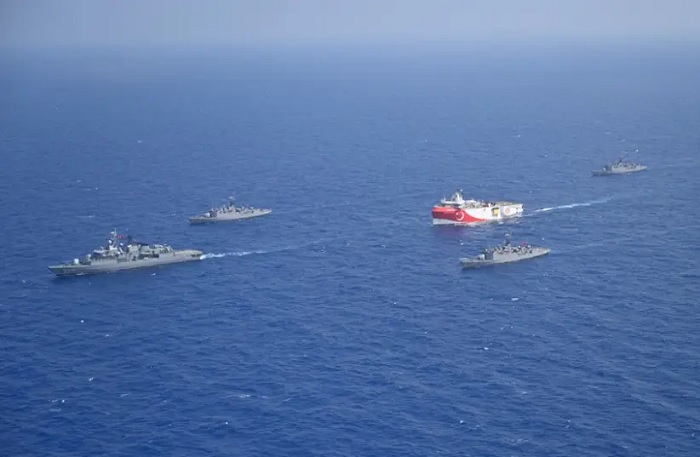
The US State Department, in unusually tough language, slammed Turkey for creating another crisis off the coast of a small Greek island. Turkey has been using NAVTEX, a naval warning announcement, to force its navy into Greek waters or off the coast of Greek islands under the guise of “research.” It is a carefully orchestrated series of provocations by Ankara, stage-managed every month by Turkey’s increasingly aggressive an extremist far-right President Recep Tayyip Erdogan, to try to bully Greece and Mediterranean countries.
The US said that it “deplores Turkey’s October 11 announcement of renewed Turkish survey activity in areas over which Greece asserts jurisdiction in the Eastern Mediterranean. Turkey’s announcement unilaterally raises tensions in the region… and deliberately complicates the resumption of crucial exploratory talks between our NATO Allies Greece and Turkey. Coercion, threats, intimidation, and military activity will not resolve tensions in the Eastern Mediterranean. We urge Turkey to end this calculated provocation.”
Turkey announced new naval drills off the coast of Turkey on October 12. This is one of many it has announced since June, often to harass Greece. Turkey is pivoting from supporting war against Armenia to new focus on the Mediterranean. Ankara tends to create new crises every week with its neighbors, part of its militarist agenda and also to distract from financial troubles at home.
Turkey has been threatening Cyprus, Egypt, Israel, the UAE, Libya, Greece, France, Armenia, Syria, Iraq and other countries in recent months. Turkey has also bombed Iraq, sent extremists into Syria to ethnically-cleanse Kurds, Yazidis and Christians, encouraged Azerbaijan to attack Armenia, sent Syrian extremists to Azerbaijan to attack Armenia, claimed that Jerusalem belongs to Ankara and that Turkish-backed Islamists will “liberate” Jerusalem, hosted Hamas terrorists, exported Syrian rebels to Libya, threatened a French warship, flown drones near Greek islands, used a Russian S-400 system to threaten Greek planes, harassed a Greek F-16, and also sought to involve itself in the US election.
The European Union foreign policy chief Josep Borrell said that Turkey sending its navy and research vessel Oruc Reis to harass Greece was “regrettable” and Germany also condemned Ankara’s action. The unity of condemnation against Ankara appears to represent a growing consensus that no longer accepts Turkey’s propaganda and claims and realizes Ankara is purposely threatening Greece. The US has also critiqued Turkey’s ruler for hosting Hamas in August.
Ankara’s actions are now getting more of a spotlight. Russia has expressed concern about Turkey sending Syrian mercenaries to Azerbaijan. Israel and the Eastern Mediterranean gas forum with Egypt, Greece, Cyprus and others are coalescing into a mutually beneficial economic grouping and Ankara has tended to try to challenge all the countries that are part of that emerging group.
The increasing criticism from Europe and the US about Turkey’s actions are still just diplomatic and it remains to be seen if the European countries or the US will put their naval might behind Greece and make it clear that further abuse of these NAVTEX drills by Ankara will not be welcomed. US Secretary of State Mike Pompeo’s recent trip to Greece and Cyprus indicates the is taking this seriously. Israeli Defense Minister Benny Gantz also said that Turkey was opposed to regional peace, another example of the rising number of voices against Ankara’s constant threats, aggression an crisis-making policy.
 Eurasia Press & News
Eurasia Press & News
